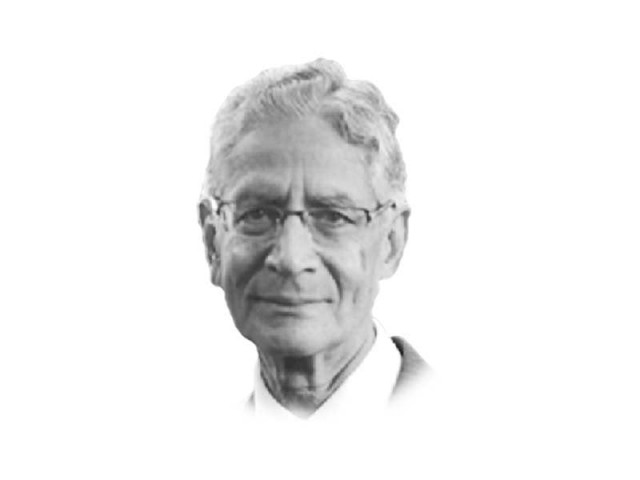The future of democracy
Democracy is under threat by liberalism, populism, authoritarianism, and extremism

The writer, a former ambassador, is adjunct professor at Georgetown University
Let us look at the advanced democracies like the United States. The euphoria incited by the fall of the Berlin Wall and Francis Fukuyama’s book, The End of History, had surged into a kind of liberal triumphalism whose nexus with globalisation went on to create enormous world prosperity. But along with prosperity came a new breed of global elite and concentration of wealth in the hands of what has become known as the top 1%.
Money had always influenced politics to a degree. But with big money came big influence. And as money and politics began chasing each other it gave a new opportunity and role to the mushrooming 24/7 cable television--to be a broker between special interests, politics and the public. The media interpreted the world around people, and made choices for them, even choosing their politics.
No one did it as well as Roger Ailes who set up Fox News in 1996 which in time became the most watched network in America. Ailes “hatched the prototype news organisation of the 21st century: information with attitude; facts yoked to a point of view, the more provocative the better; a tribal vibe…Ailes did that — by proving that there is money, influence and power to be found in serving well-defined interest groups (The Washington Post May 19, The dark source of Roger Ailes’s power by John Klein).
Fox thrived on grievance and alienation, and there was enough of it caused by global and domestic forces. Jobs and factories were going to foreigners and foreign countries, and income levels were falling affecting the so-called American dream. People felt victimised and excluded at the hands of elements they did not understand prompting them to look for scapegoats. Fox catered them with xenophobia and right-wing politics blessed by the religious right. And that led to a divided country followed by a polarised politics, and radicalised political parties especially the Republican Party.
Serious discussion of serious issues suffered not just because of polarisation and politicisation of issues but also because of their trivialisation as the news was packaged as entertainment at the hands of entertainment giants like Disney, Time Warner and Viacom that came to own many TV networks including ABC and CNN. The news entertained, and was feeding and fed on people’s politics.
While Republicans and Democrats each tied to its base and special interests vied for political power in a gladiator sport with the help of partisan media people felt marginalised. The theme of the democracy is people. And democracy should be geared towards this end but it was not. The system gave people only an illusion of power by playing on their grievances without redressing them.
It took a professed Socialist, Bernie Sanders, to speak for the people. But American democracy was not ready for it. So it took a salesman and marketing genius to brazenly use populism and sell illusion as a reality. Poachers became game keepers as a hapless public was fooled twice.
American people’s commitment to democratic values remains intact as does the system of checks and balances and the stability and integrity of its institutions. Whether American democracy emerges unscathed from the Trump assault however remains to be seen. Populism as we know leads to authoritarian tendencies and sharpens societal fault lines, and is a threat to democracy.
Not just in America but in Europe as well economic disadvantage and income inequality was leaving the lower classes behind inciting social discontent and anti-immigrant sentiment. Whether Brexit or Macron will be Europe’s future, however, is not clear.
The non-Western world faces its own challenges to democratic aspirations. Even in relatively stable democracies like Brazil and South Korea corruption still contaminates the political system. And look at the secular India where a staunch Hindu nationalist has come to power with the help of RSS, the big business and media pyrotechnics. And he continues to use Facebook, Twitter and blogs to bypass the regular media. Modi’s social media strategies have succeeded to control dissent, and manipulate national narratives on issues. How much dissent has there been in the Indian democracy to his brutal and inhuman repression in Kashmir?
In emerging democracies the picture is different but no better. The power structure in most countries remains dominated by a narrow ruling elite that has neglected for years mounting socio economic problems and multiple internal conflicts. A genuine democratisation of many such societies has to varying degrees been sacrificed or compromised to the personal, oligarchic and dynastic interests of the ruling elite.
Look at Pakistan where the feudal economy may be changing but the influence of feudal mindset in politics, governance and law lives on. Not paying tax is not a financial issue. It is symbolic of a sense of entitlement and inequality before law. And the civil military equation is but another of the many power imbalances in the country. Surrounding attitudes and habits of mind that promote democratic culture are not there. Then there is the threat of extremism. Democracy instead of defeating extremism risks getting defeated itself by extremism.
The electronic media in Pakistan has in its own way failed to contribute to a greater understanding of issues and promote democratic values. Fine Opeds are being written in the print media but the electronic media has a far greater influence. And unfortunately over there what we are getting are divisive, exclusionary and extremist enclaves of opinion. Social media is causing another set of problems. Everybody has an opinion and it is often not his own. And opinion is moving faster than knowledge sabotaging our understanding of issues.
Finally there is this systemic issue with a democratic system best explained by Lee Kuan Yew. When asked once on Charlie Rose Show what he thought of Western democracy, he replied the system had become so competitive and combative that in order to come to power the opposition was all the time planning to undermine the government by misrepresenting or distorting issues and thus misleading the public. It would be a sad day when this kind of democracy comes to Singapore, he said.
Published in The Express Tribune, June 23rd, 2017.
Like Opinion & Editorial on Facebook, follow @ETOpEd on Twitter to receive all updates on all our daily pieces.















COMMENTS
Comments are moderated and generally will be posted if they are on-topic and not abusive.
For more information, please see our Comments FAQ